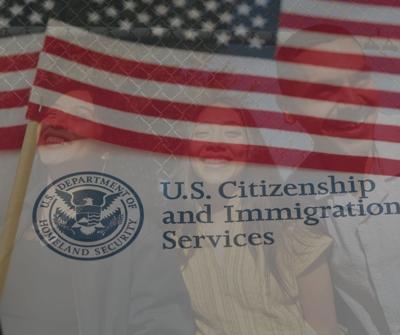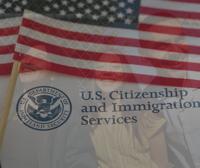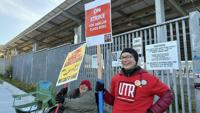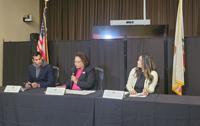
(Canva art created by Amairani Hernandez.)
Recent research from the UCLA Latino Policy and Politics Institute explores the health and social impacts of President Donald Trump's executive order to terminate birthright citizenship.
On January 20, 2025, Trump issued an executive order to end birthright citizenship in the U.S., a constitutional right guaranteed by the 14th Amendment. The order would deny citizenship to children born in the U.S. to an undocumented immigrant mother and a father who is not a U.S. citizen or green card holder, or a mother with a temporary status, such as on a student, work or tourist visa, and a father who is not a U.S. citizen or green card holder.
The executive order has sparked lawsuits in 22 states. This week, U.S. District Judge Deborah Boardman blocked the executive order for the second time. The order “contradicts 125-year-old binding Supreme Court precedent and runs counter to our nation’s 250-year history of citizenship by birth,” Boardman said during a hearing on Wednesday. “No court in the country has ever endorsed the president’s interpretation,” she added. “This court will not be the first.”
While this executive order has been blocked by the courts, it is already taking a toll on the health and well-being of Latino communities, according to UCLA’s study. The research, written by Dr. Lucía Félix Beltrán, Rosario Majano, Ahmad Ismail, Jie Zong, Dr. Silvia R. González and Dr. Arturo Vargas Bustamante, reveals that anti-immigration policies and ending birthright citizenship would destabilize millions of families, worsen health outcomes and contribute to greater social instability across the country.
The Children’s Institute, an organization with an influential presence in Los Angeles, is currently helping undocumented families with helpful resources in response to Trump's current immigration policies. A representative of the Children's Institute told CALÓ News that they have been hearing a lot of worries from the South Los Angeles community members.
Unfortunately, due to the ongoing fear within the community, the organization has witnessed a decline in the utilization of their mental health services. “We're seeing that clients are either opting out of their sessions, and because of the fear of coming in person, they'll either do telehealth with one of our therapists or they just won't. They'll cancel,” said their representative.
The UCLA research data and the statement from the Children's Institute indicate that anti-immigration policies prevent families from accessing essential services, leading to worse health outcomes.
In 2023, despite the reversal of the 2019 Public Charge rule, about 12% of adults in immigrant families avoided programs like Medicaid, the Supplemental Nutrition Assistance Program (SNAP) and housing assistance—fearing it could jeopardize their green card applications.
Additionally, over 130,000 Latino children potentially lost access to their usual source of healthcare because their caregivers avoided public health programs due to immigration concerns.
As of January 21, 2025, Trump announced that his administration would allow Immigrations and Customs Enforcement (ICE) and Customs and Border Protection (CBP) officers to conduct arrests in sensitive areas, such as schools, hospitals and churches, reversing a 2011 policy that prohibited arrests being made in those places, which further discourages undocumented immigrants from seeking care out of fear of encountering ICE.
The second key finding from the research emphasizes that limiting birthright citizenship will create additional barriers for Latina mothers, such as access to prenatal care, raising costs and negatively impacting infant health.
Newborns of undocumented mothers who did not receive prenatal care had twice the postnatal and long-term pediatric care costs compared to those with at least one prenatal visit, according to the study. It also states that attending at least two prenatal visits has been shown to help reduce stress, which highlights the importance of prenatal care accessibility.
Their data also demonstrates that undocumented immigrants contribute more to the U.S. health system than they receive in healthcare services. Immigrants contribute more to the U.S. healthcare system than they use. In 2017, immigrants generated a net surplus of $63.2 billion in payments to Medicare, Medicaid and private insurers.
These findings challenge the misconception that immigrants place a strain on the healthcare system and emphasize their crucial role in supporting public programs for all U.S. residents.
Additionally, the data also shares that Latino children would be the most disproportionately affected by changes to birthright citizenship. In 2022, four million children of ages 0 to 17 with noncitizen parents were Latino and while not all noncitizens would be affected by the executive order, previous research estimates that about 54% of noncitizen immigrants are undocumented or temporary visa holders. The institute projects that approximately half of Latino children born to noncitizen parents would be affected if this executive order was allowed by the courts.
“This policy represents a real threat, disguised as immigration reform. The fear and misinformation it generates will deter millions from seeking necessary care, with lasting health and economic repercussions,” said Dr. Bustamante.











(0) comments
Welcome to the discussion.
Log In
Keep it Clean. Please avoid obscene, vulgar, lewd, racist or sexually-oriented language.
PLEASE TURN OFF YOUR CAPS LOCK.
Don't Threaten. Threats of harming another person will not be tolerated.
Be Truthful. Don't knowingly lie about anyone or anything.
Be Nice. No racism, sexism or any sort of -ism that is degrading to another person.
Be Proactive. Use the 'Report' link on each comment to let us know of abusive posts.
Share with Us. We'd love to hear eyewitness accounts, the history behind an article.